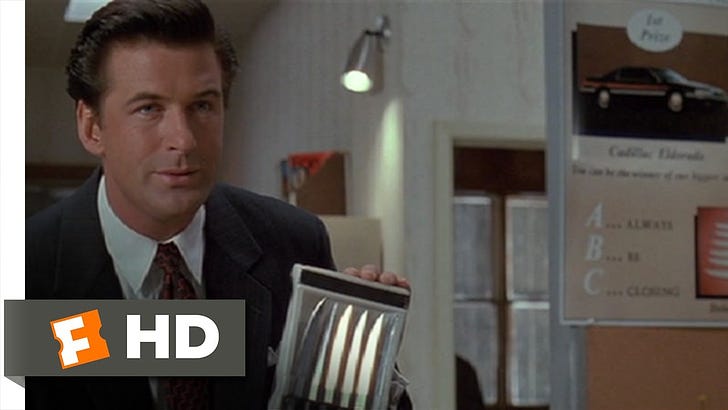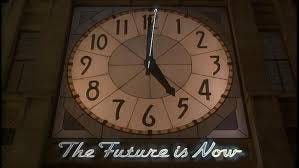The Future, the Myth of the Digital Age, Opportunity, and a Lesson from the 1980 Winter Olympics
The more things change, the more they stay the same – but it need not be thus, forever.
In the early 90s, I began a career in commercial B2B (business-to-business) sales in the telecom industry.
Over the next decade, I would hold various roles in a number of different companies – one of which was that of a national account executive for voice services with AT&T–Global.
Each role with each company meant sitting through interminable meetings where the latest personification of The Peter Principle would deliver his motivational pep talk using any number of corporate-speak platitudes, latest buzz words, and outdated hip-hop cultural references that were every bit as sensible and meaningful as a Kamala Harris word salad. In other words, not this:
On one occasion, the suit-of-the-quarter pointed out that his focus – hence, what mattered – was not today’s customers, but rather tomorrow’s customers.
His challenge to us was to focus on the future – customers, our careers, our roles in what the industry will be five, ten years from today. It was quite a departure, as most of those meetings were about the here and now. This particular suit was on to something quite unorthodox, and I’m sure as soon as word of the content of his address to us reached the executive suite, he was summarily dismissed – he was right, though.
My entry into the industry was due in large part to the federal government’s court-ordered break-up of AT&T1, and I was joining at a time when the far downstream effects of that action had turned a highly regulated, very mature industry on its head.
This new landscape, combined with the dot-com boom, revealed The Death Star (my


affectionate reference to my then-employer) to be a staid, conservative, management-heavy dinosaur in a world where its competitors were cheetahs – agile, fluid, financially liquid, and able to quickly adapt to changes in the market – something that breaking itself up into smaller, management-heavy dinosaurs could not mitigate.
In a very short period of time, there were new competitors, many of which were start-ups funded by a seemingly endless supply of venture capital. These new entities were offering technologically innovative, and in some instances, highly specialized products and services (including the staples of long-distance and local exchange service first to commercial and institutional enterprises, and eventually to mass market consumers) – and laying claim to the revenue streams that once were the behemoth’s former customers.
It wasn’t clear to me then, but I was bearing witness to the death of an American institution at the hands of federal government lawyers prosecuting a decades-old civil action begun by other federal government lawyers. This fact only made it a longer and more painful death than would have otherwise been the case had its fate been determined by market forces.
AT&T, a flagship of American industry since 1885, had come into the height of its power during the nation’s post-war industrial golden age. Aided from federal government regulation that all but codified its status as a legal monopoly, it had become the corporate equivalent of the woolly mammoth, and it was being picked apart by the vultures of Sprint, MCI, and WorldCom.
The final insult was the forced divestiture of almost all of its other holdings2 in the wake of the CEO’s decision to grossly overpay for TCI in a spectacularly failed attempt to return the company to its former glory as an end-to-end carrier.
Now, the once-mighty tech giant whose stock had long been considered as blue-chip was facing a future – driven by technological innovation – that would be realized one way or another, with or without it. Fiber-optic cable replaced copper wire, cellular telephone service replaced landlines, and wireless technology’s data applications like VoIP (Voice-over-Internet Protocol) made voice a liability. The Death Star could not rid itself of its voice business fast enough, shifting its investment to data, instead. As an account executive on the voice side, I was shown the door with approximately a dozen others.
My career limped along with gigs at a couple tech firms where my knowledge of and experience in the telecom industry was useful to an extent, but the dot-com bust sealed its fate – and it came to an abrupt and ignominious end in the airport in Fort Lauderdale when my boss informed me I was being let go.
It was probably one of the best things to ever happen, though, as it forced me to face the facts about my present, and make some decisions regarding my future. My technical knowledge and skills were obsolete, and the plum jobs remaining in the industry that was now a ghost of its former self were going to others who were better connected.
So I went back to school, crammed four years into one, and earned a second bachelor’s degree. The environment in the Chicagoland area for tech jobs was tight as a drum, so I did what was necessary to survive until I finally landed a contract-to-hire role as an assistant web manager, and began my new career in the tech field.
The lesson here is that it is the future that matters. If you don’t believe me, take it from Noah Cross3:
What does this have to do with the current culture war? In what way is it applicable to the current state of affairs?
The answer to the first question is, everything. The answer to the second question is as follows:
In my last post, I wrote that the need of the hour, of the year, and of the next several generations is for creators of content that is more culturally and politically conservative (even if of a more secular orientation), as well as that which is faith-based. That remains the absolute truth, because the importance of the storyteller is a constant across millennia.
Every bit as crucial as are the tellers of our stories, however, is ownership of the medium through which they are told. In explaining how politics is downstream from the culture, Breitbart’s focus is on TV and film. A much more insidious and no less existential threat lies in terrestial radio, the one medium clearly owned by conservatives courtesy of Rush Limbaugh.
George Soros, otherwise known as The Devil, recently acquired a forty percent ownership stake in Audacy, the nation’s second-largest radio communications holding company. Audacy controls the broadcast licenses of more than 200 radio stations in 40 markets nationwide4. If you don’t think that the content of what those stations broadcast won’t gradually reflect the radical leftist agenda, think again. We would do well to recognize this for the threat it is, lest this battle in the culture war is lost5.
TV and film are not going anywhere any time soon, so the need to establish a presence in these media, demonstrate value, and provide economic justification for the secular entities to buy in is critical if we are to get our stories told to those who otherwise might never hear them.
The Myth of the Digital Age: The Death of the Hardbound Tome
The same holds true for the publishing of tangible books. We’ve been in the digital age for more than two generations now, and I recall it being considered an existential threat to the physical, hardbound book. That threat has yet to be realized, despite the proclamation6 of one Egon Spengler, Ph.D., and the boom and bust of brick-and-mortar bookstores (See Border’s, B. Dalton, Waldenbooks, et al.).
For all intents and purposes, the left also owns the publishing industry – though, when an online search of ‘conservative publishers’ was performed, it was a most pleasant and encouraging surprise. Here are ten publishers of decidedly conservative content in existence, today:
The left’s dominance of the legacy media that are TV and film (the inroads made by conservatives and Christians notwithstanding) ensures that the sitcoms, dramas, news and public affairs programming will never again reflect the social mores of white, Anglo-Saxon protestants.
While that may be less true for film, it is all the more reason to persist in current initiatives and to steadily increase the amount of positive, hopeful, and faith-affirming content that many people want to consume. We would do well to emulate the same in the print media, and the good news is that it seems we already have a bit of a head start, but far too many of us don’t realize it.
Opportunity We Will Not See Again
The digital frontier is the real battleground in the next phase of the culture war. From the beginning, the left has sought to position itself as the guardian of the evolution of the modern digital age, and it has been largely successful in making that seem to be the case.
There was a time – roughly, from 1994 until 2006 – when the internet was the digital wild west. Widely accessible to anyone who owned a domain (a web address, like www.mydomain.com), and unregulated (for the most part), it gave rise to some remarkable innovations, one of which was You Tube – another was Amazon – then came social media.
The digital wild west began to become less so in 1998 with the arrival of the Google web browser, which today handles more than seventy percent of online search requests worldwide.
By 2016, the digital wild west was no more – not because the authority of law and order based on truth, justice, and the American way had been established, but because Google’s parent company (Alphabet, Inc.), began to acquire properties like YouTube, and its formation of subsidiaries like Google Analytics (GA), and Google Ad Manager (GAM) facilitated unprecedented reach and dominance. This is significant because in so doing, it was becoming one of the most powerful oligarchs of the digital landscape.
Perhaps most significantly, the formation of Google Cloud Platform (GCP) made it only one of a handful of entities (the others included Amazon Web Services, Microsoft, and Akamai) that constitute the backbone of the worldwide web. The vast majority of commerce transacted over the internet is facilitated by either GCP or AWS (Amazon Web Services), and a smaller portion of that by Apple (which really only cares about its own).
Not limited to e-commerce, GCP and AWS control almost all other platforms and their content, and any such entity unwilling to abide by their “terms of service” (arbitrarily enforced) will be removed, and its existence is no more – see, Parler8.
It isn’t that there is little to no conservative-oriented content on the internet – there’s plenty, in fact. For social media, there is Gab, QAnon, BitChute, 4Chan, and a number of others. For messaging, there is Telegram, and Discord9, but most are buried deep in the results returned on any search performed by the web browser’s algorithm. This isn’t necessarily bad because as we’ve seen, when Facebook and Instagram shadow-ban conservative voices, when Google de-monetizes conservative content, those platforms become echo chambers, influential only among themselves.
Nonetheless, there are plenty of examples of the king of the hill being knocked off by the next up-and-comer. This is brilliantly demonstrated by the hardware through which access to the worldwide web was gained. First, there were desktop computers which were quickly replaced by laptops which were replaced by mobile, hand-held devices like smart phones that could do everything that laptops could. Smart phones now have to co-exist with smart watches worn on the wrist. I shudder to think what might be the next step.
In terms of software and applications, Facebook rendered MySpace irrelevant almost overnight. Google’s web browser nearly did the same with all but a few that have managed to hang on – Mozilla Firefox, Yahoo!, Bing, or Edge (both Microsoft properties)10, for example. Brave, and DuckDuckGo market themselves as browsers whose search engines put their users’ data privacy first, but I remain skeptical11.
Parler once threatened (however briefly) to replace Twitter as the king of the messaging platform hill. Parler had done its homework, and content that was all but guaranteed to warrant a terms-of-service violation on the AWS platform never saw the light of day. Nonetheless, when it first came on the scene, it was beset with all manner of real resistance from all corners of the internet in the form of DDoS12 attacks, yet it was perceived as posing a credible threat.
Twitter had managed to create its own presence without being acquired by Google, Facebook, or Apple. In its early years, it was largely apolitical which in my view, aided a great deal in its success. Unfortunately, like every other contemporary staff sergeant of industry, Jack Dorsey capitulated to the leftist, woke mob.
In 2020, Twitter joined Facebook, Instagram, Google, and Apple in censoring voices that were not toeing the line on any given approved narrative – be it Hunter Biden’s laptop, the source of the Chinese virus, or the “mostly peaceful protests” (read as, violent) of that summer. Then, in the wake of the lies (ironically, actual disinformation) about January 6, Twitter denied an American president access to the public square. In doing so, it unwittingly became an acquisition target, was purchased by Elon Musk, and made over to comprise all points of view, much to the chagrin and irritation of the very online13.
TruthSocial is a valid alternative to Facebook, and Rumble will eventually eclipse YouTube as soon as it begins to lose money for Google.
So, why the brief recap of the history of the digital age? To illustrate that now, more than perhaps has ever been the case, the digital media landscape is increasingly fluid despite the left’s success (thus far) in projecting the image of its status as the vanguard of the culture vis-á-vis digital media outlets.
In this way, the left is very much like the former Soviet Union’s national hockey teams. Far too many of us continue to view the left’s control of the culture with fear and trepidation – and here, the 1980 Winter Olympiad has something to teach us.
A Lesson From the 1980 U.S. Olympic Hockey Team
In the film, Miracle, there is a scene in which the team is viewing film – not video – of the Soviet national team in action. Coach Herb Brooks describes to his players the Soviets’ style and method of play, and points out that the Soviets’ main weapon is intimidation – they know they are going to win – and their opponents know it, too. Hence, the game is over even before the teams are on the ice.
Brooks continues that no other hockey team has been willing to adapt its style of play to that of the Soviets, but that the team that is willing to do just that can, in fact, beat them at their own game. He then makes it clear that they are that team.
In his remarks before what would be a world-changing contest, he acknowledges the truth – that nine times out of ten, the Soviets would probably win – but not this time14.
Everyone knows what happened next – the Russians could not be defeated, until they were.
So, the question now is, “What will be the next Tik-Tok?” or, “What will be the next Twitter?” and the next question might be, “Who will be in control of it?”, and that presents a dilemma for us because we’re not disposed toward controlling anything. So, the better question might be, “How do we make sure whatever is next doesn’t fall under the control of the left?”
For those of us who simply wish to be left alone, that will always be our ideal – but paradoxically, we have no choice now but to engage in the culture war, in whatever way that may be. The current environment and circumstances demand that each of us choose one of two sides15 – and not to decide, is to decide16.
This is where it becomes every bit as much a matter of perception, and a matter of faith as much as anything else. If we believe that the left can never be displaced as the owners of legacy & digital media in any or all of their outlets, as well as the media of the future, then it never will be.
If instead we believe that it can be done, that we not only can hold our own against more formidible forces but prevail by creating our own digital spaces independent of the current oligarchs, we can deny them unmitigated hegemony over the digital media realm.
The left then becomes little more than an obstacle to be overcome – an annoyance, not a Goliath – and with that, the landscape begins to resemble and reflect the values of faith, freedom, individual responsibility & accountability, diversity of ideas and viewpoints rooted in reason and tolerance, and equality under the law.
The forces of darkness currently at work may ultimately prevent the restoration that many of us long to see, but that doesn’t mean we surrender to those dark forces – no, we fight back by first standing firm against them, then we counter with stories of faith, hope, and love.
Thank you, dear reader, for your indulgence.
Until next time…
If there is a more short-sighted, vainglorious refusal to embrace a future where the enterprise under your leadership is the premier wireless communications provider in the U.S. having acquired McCaw Cellular], I am not aware of it.
He should have written a book titled, How I Turned a Fortune 100-Telecommunications Giant Into the Nation’s Largest Cable Company With a Market Value of $25,000.00 and Walked Away With A Golden Parachute While Tens of Thousands Were Laid Off, Furloughed, or Fired
No, I am not obsessed with the film, Chinatown. It’s story of power and corruption is as old as time itself, but the way it is told by Robert Towne and Roman Polanski, and the characters and the actors who portray them make it a most enjoyable film, and clearly one of my all-time favourites.
https://www.cnn.com/2024/09/30/business/audacy-bankruptcy-soros-gop/index.html
“The history of failure…can be summed up in two words: Too Late. Too late in comprehending the deadly purpose of a potential enemy; too late in realizing the mortal danger; too late in preparedness; too late in uniting all possible forces for resistance; too late in standing with one’s friends.”
–General Douglas MacArthur
Richard Nixon, The Real War, Warner Books Edition, 1980
Janine Melnitz: You're very handy, I can tell. I bet you like to read a lot, too.
Dr. Egon Spengler: Print is dead.
This one was a bit of a surprise, to me…Chris Christie is as much a conservative as The New York Times is a monument to journalism.
https://en.wikipedia.org/wiki/Parler
One reason I never trusted the new Parler is I couldn’t help but wonder just what kind of deal its owners made with their overlords. You can bet that truly free speech was not preserved in the Ts & Cs.
These are more conservative-friendly than those that are hard-core, conservative orthodox
https://www.techtarget.com/whatis/definition/Microsoft-Edge
Why? Because ad revenue is the life blood of web browsers, and advertisers are not going to pony up significant dollars if they can’t collect data on who’s being reached by their ads on which browser.
https://www.akamai.com/glossary/what-is-ddos#:~:text=What%20is%20a%20DoS%20or,a%20target%20from%20multiple%20locations.
In a distributed denial-of-service (DDoS) attack, a type of cyberattack, an attacker overwhelms a website, server, or network resource with malicious traffic. As a result, the target crashes or is unable to operate, denying service to legitimate users and preventing legitimate traffic from arriving at its destination.
https://www.usatoday.com/story/sports/columnist/mike-freeman/2023/02/12/super-bowl-57-blackest-woke-sorry-haters/11245293002/
To paraphrase the ink-stained wretch Mike Freeman of USA Today, “[a] step…so transformative when [it’s] really pretty basic. What’s that saying? When you’re used to privilege, equality feels like oppression.” Sound familiar?
Chills – every time I view that clip. “You were born to be hockey players.”
There are only two – you can’t be on a third one, your own – it doesn’t work that way.
“Silence in the face of evil is itself evil: God will not hold us guiltless. Not to speak is to speak. Not to act is to act.”
― Dietrich Bonhoeffer
https://www.goodreads.com/quotes/601807-silence-in-the-face-of-evil-is-itself-evil-god






If something can’t go on it won’t. Total leftist cannot go on forever, but a lot of damage can be done in the meantime.
With all due respect, Russia would have gotten the Gold in the 1980 Olympics if Sergey Fedorov, Slava Fetisov, Igor Larionov, Vladimir Krutov, and Alexander Mogilny had not become NHL players.